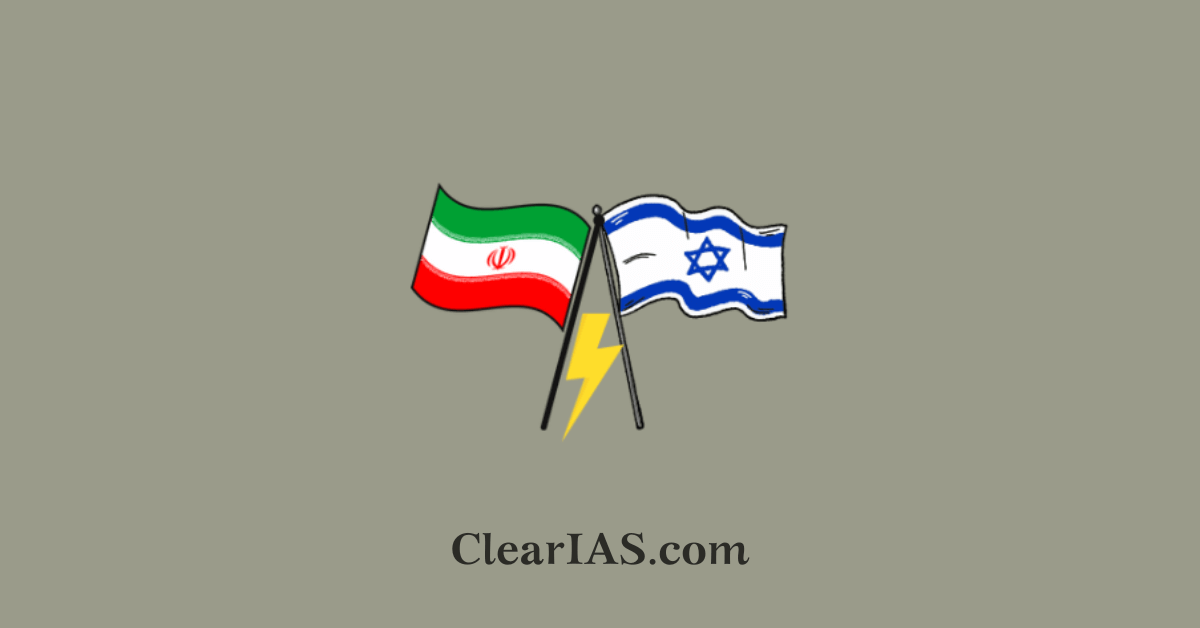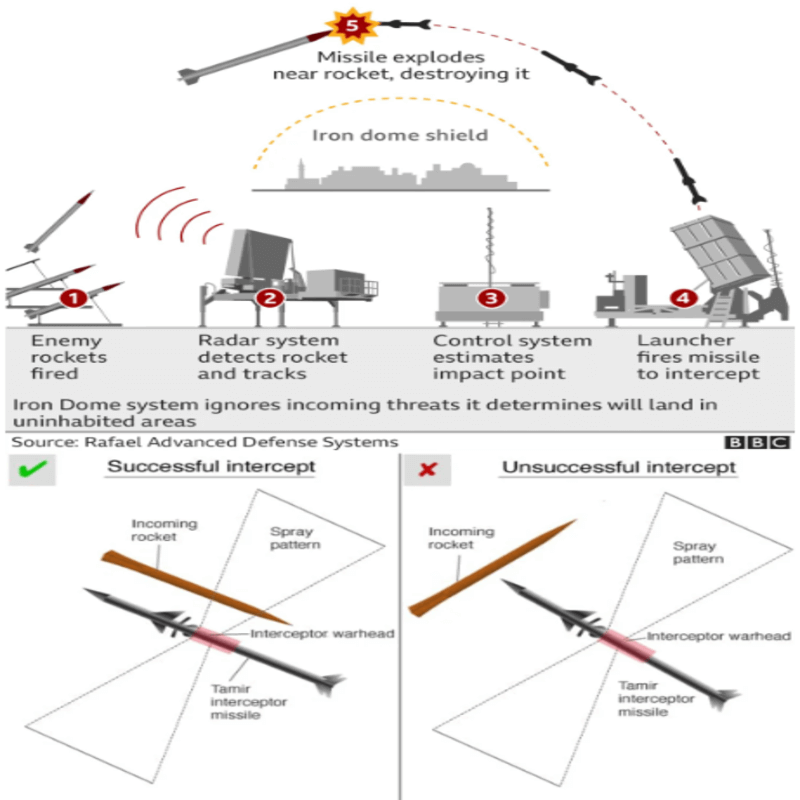
Iran-Israel relations have been markedly hostile, with no formal diplomatic ties and a history fraught with conflict, rhetoric, and proxy wars. This hostility can be traced through several phases from the establishment of Israel in 1948, the Iranian Revolution in 1979, and the subsequent developments to the present day. Read here to know more.
There are four main periods in the history of Iran-Israel relations: the tumultuous 1947-1953 period, the friendly Pahlavi dynasty period 1953-1979, the deteriorating 1979-1990 period after the Iranian Revolution, and the current open hostilities that have continued since the Gulf War ended in 1991.
13 nations, including Iran, voted against the United Nations Partition Plan for the British Mandate of Palestine in 1947. It was Iran that voted against Israel’s UN admittance two years later as well.
Iran-Israel Relations: Historical Background
Pre-1979 Iranian Revolution:
- Early Relations: Post-1948, Iran was among the Muslim-majority countries that did not recognize the state of Israel. However, the practical realities of geopolitical and strategic interests led to a somewhat covert relationship between the two.
- Iran was the second Muslim-majority country to recognize Israel as a sovereign state after Turkey.
- The Pahlavi Dynasty: Under the rule of Mohammad Reza Shah Pahlavi, Iran and Israel had secret but substantive diplomatic, economic, and military ties. Iran supplied Israel with oil, while Israel helped Iran with agricultural development, military hardware, and intelligence.
- Strategic Alliance: During this time, both countries saw benefits in collaboration, mainly as a counterbalance to Arab nationalist movements and the influence of the Soviet Union in the Middle East.
Post-1979 Iranian Revolution:
- The Shah’s overthrow and the Islamic Republic’s establishment under Ayatollah Khomeini marked a dramatic shift. Khomeini vehemently opposed Western influence in the Middle East and viewed Israel as a “little Satan” allied with the “Great Satan,” the United States.
- Iran severed all diplomatic ties with Israel and has since been a staunch supporter of Palestinian militant groups, including Hamas in Gaza and Hezbollah in Lebanon, both of which are committed to Israel’s destruction.
Continued Tensions and Conflict
Ideological Opposition:
- Iran’s government is committed to an ideology that sees Israel as an illegitimate state. Iranian rhetoric frequently includes predictions of Israel’s demise and support for any party opposing Israel.
Nuclear Issues:
- One of the greatest points of contention has been Iran’s nuclear program. Israel perceives a nuclear-armed Iran as an existential threat and has repeatedly stated its position that it will take any necessary action, including military strikes, to prevent Iran from developing a nuclear weapon.
- Accusations and international sanctions have further complicated relations, with Israel being a vocal advocate for tough sanctions against Iran in international forums.
Proxy Wars and Regional Influence:
- Both countries have engaged in what is often termed a “shadow war,” where both states conduct covert operations against each other, including cyberattacks, assassinations of nuclear scientists, and strikes on military bases in Syria where Iranian forces are stationed.
- Israel consistently targets Iranian positions in Syria, aiming to prevent Iranian military entrenchment and the transfer of advanced weapons to Hezbollah.
International Diplomacy and Alliances
- Iran’s relationships with countries hostile to Israel, like Syria and, to a lesser extent, Russia, in addition to its support for proxy groups, are part of its broader strategy to increase its influence in the Middle East and counter Israel.
- Meanwhile, Israel has built alliances with other nations concerned about Iran, notably forming tacit ties with some Gulf Arab states, culminating in the Abraham Accords, which, while primarily normalizing Israeli relations with the UAE and Bahrain, also signify a strategic realignment in the region against Iran.
Why in the news?

Iran launched a missile attack on Israel as part of its retaliation to a suspected Israeli air strike on its consulate in Damascus on April 1, 2024.
- The U.S., Canada and the U.N. have condemned the Iranian air attack on Israel, with America reaffirming its “ironclad commitment” to the Jewish nation and vowing to convene a meeting of the G-7 leaders on April 14, 2024, to develop a coordinated response to the brazen assault.
- India said it is seriously concerned over escalating hostilities between Israel and Iran, and called for immediate de-escalation of the situation.
Read: Iron dome: Israeli Air Defence system
Iran’s relations with other middle-eastern nations
Iran’s relations with Middle Eastern countries are complex and characterized by a blend of ideological, sectarian, and geopolitical factors.
These relationships range from deeply antagonistic to cautiously cooperative, influencing regional security, politics, and economic interactions.
Saudi Arabia
- Iran and Saudi Arabia have been regional rivals for decades, with their competition often described as a proxy war between the predominantly Shia Iran and Sunni-majority Saudi Arabia. The rivalry is deeply rooted in ideological, religious, and geopolitical differences, influencing conflicts in Syria, Yemen, and elsewhere.
- Relations have been particularly tense due to accusations of Iran supporting Shia militias throughout the Arab world and Saudi Arabia’s support of Sunni counterparts. However, recent efforts, notably since 2021, show a potential thawing, with both nations engaging in diplomatic talks to reduce tensions.
Iraq
- Iran has a significant influence in Iraq, especially following the U.S. invasion in 2003. Iran supports several Shia militias and political parties in Iraq, leveraging historical, religious, and cultural ties.
- The relationship is sometimes strained by internal Iraqi politics and the challenge of balancing U.S. and Iranian interests, but Iran remains a crucial player in Iraqi affairs.
Syria
- Iran is a staunch ally of Bashar al-Assad’s regime in Syria. It has provided substantial military support, including advisers, ground troops, and economic aid, to help Assad maintain power during the Syrian civil war.
- This involvement is motivated by strategic interests, including maintaining a corridor of influence from Iran to the Mediterranean and supporting Hezbollah in Lebanon.
Lebanon
- In Lebanon, Iran’s main proxy is Hezbollah, a Shia Islamist political party and militant group. Iran’s support for Hezbollah includes financial, political, and military backing.
- This relationship has entrenched Iran’s influence in Lebanese politics and has been a major point of contention with Israel and Sunni Arab states.
Yemen
- Iran is alleged to support the Houthi rebels in Yemen, though the extent of this support is a subject of international debate. The conflict is often seen as another arena of the Saudi-Iran proxy conflict.
- Some view Iran’s involvement as part of its broader strategy to expand its influence across the region, particularly at the expense of Saudi Arabia.
Turkey
- Relations with Turkey are complex, given that both countries have significant regional ambitions. However, their economic ties are strong, with significant trade, especially in natural gas and oil.
- Politically, they have had differences, particularly over the conflict in Syria and the issue of Kurdish independence. Yet, they often find common ground on issues like opposition to Kurdish independence and managing the flow of refugees.
United Arab Emirates
- Relations with the UAE have been historically strained due to territorial disputes and Iran’s broader regional policies. However, economic ties have remained robust, with Dubai serving as an important hub for Iranian business.
- Recent years have seen a slight improvement in diplomatic relations, particularly as part of broader regional dialogues.
Qatar
- Iran has relatively good relations with Qatar, especially following the blockade by Saudi Arabia, UAE, Bahrain, and Egypt in 2017. Qatar shares a massive natural gas field with Iran and has coordinated with Tehran on exploitation strategies.
Current State and Future Prospects
As of now, there is no indication of normalization of relations between Iran and Israel. Both countries continue to view each other with deep suspicion and hostility.
The prospect of future conflicts, either directly or via proxies, remains high, and any significant change would likely require a profound transformation in regional politics or the internal politics of either country.
Related article:
- Israel-Palestine conflict
- India-Iran relations
- India’s stand on the Israel-Palestine conflict
- Iran nuclear deal
- Chabahar Port
-Article by Swathi Satish






Leave a Reply